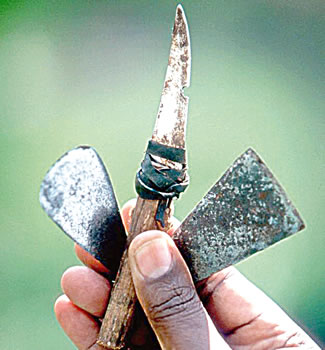Communities in Kwara State have decried the practice of female genital mutilation (FGM) in parts of the state, calling on civil society organizations and all relevant stakeholders to address the development.
Speaking at an advocacy programme organized by a group of civil society organizations, including Olive Community Initiative (OCDI), Worthy Life Education and Health Foundation on FGM and circumcision in Ilorin at the weekend, representatives of various communities in the state said that the practice is unconstitutional and degrading.
One of the people at the programme, Mrs. Olonade Rukayat from Irepodun local government area of the state, said she and her husband, Mr. Lateef Olonade, had a harrowing experience with her in-laws, who allegedly vowed to deal ruthlessly with her family for not circumcising their daughter, Qudsia, who will be six years old in December 2022.
Rukayat, the mother of Qudsia, who lived at 13, Alaafia Street, in Omu-Aran, Irepodun local government area of the state, said that every attempt and persuasion employed at dissuading the family members from the archaic practice met with stiff resistance.
She also said that a letter was written to warn her and her husband by the head of her husband’s family, Mr Rasidi Olonade, to align with the tradition or face grievous consequences like those who had previously disobeyed.
ALSO READ FROM NIGERIAN TRIBUNE
The letter, which she showed to journalists read: “I am using this medium to warn you about your refusal to circumcise your daughter. This is the fifth time we are warning you about this issue. I believe you and your husband know our family tradition, as laid down by our ancestors; and we are telling you emphatically that no civilization can change our tradition.
“If you refuse to heed our demand before your first daughter clocks six years in December 2022, we will initiate the family rituals and invoke the spirit of our ancestors against you, your husband who is our son and your daughter you claimed to be protecting.
“You can confirm this from your husband’s brother close to you, Hassan, who lost his wife and daughter before he ran away from home because he refused to obey the family tradition like you are doing now.”
Also, a middle-aged woman and mother of two, Mrs Tolani Olofin, who resides at Eessa compound, Offa, Offa local government area of the state, said that she was threatened with banishment by community youths and leaders for her refusal to allow a forcible circumcision of her twin daughters.
The disagreement with family elders, she recounted, started when her female children, clocked six and relatives reminded her of the cultural practice, which must be undertaken between the ages of six months and 10 years.
In her speech at the event, the representative of OCDI, Blessing Akanbi, said that a recent report has revealed that Kwara and Ekiti states recorded the highest levels of FGM between 2016 and 2021 with 58 and 50 per cent of total cases respectively of total cases.
While the 2021 Multiple Indicator Cluster Survey (MICS), which was developed by the United Nations Children’s Fund (UNICEF) showed a significant decrease in the cases of female genital mutilation in Nigeria,
the survey implemented by the National Bureau of Statistics (NBS), noted that 15 per cent of women aged 15-49 years have undergone FGM, down from 18 per cent in 2016.
The report further noted that eight per cent of girls aged 0-14 years have undergone FGM, down from 25 per cent in 2016.
While Kwara and Ekiti States accounted for more of the cases recorded among women aged 15-49 years, the lowest levels of FGM are found in Gombe and Zamfara states with no cases.
FGM is defined by the World Health Organisation as any procedure that involves partial or total removal of the external genitalia and, or injury to the female genital organs for non-therapeutic reasons.






